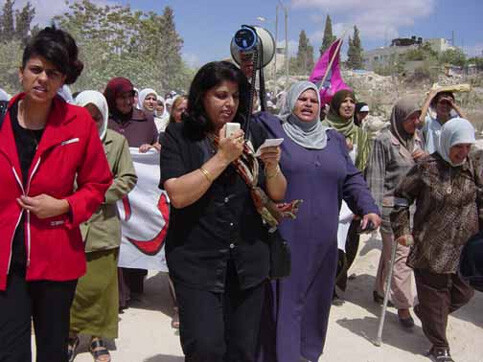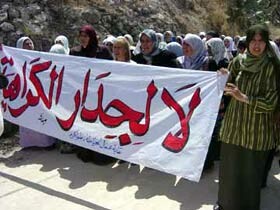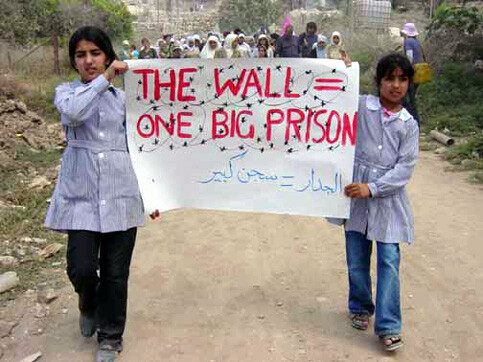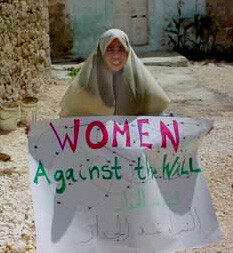17 September 2003

Tulkarem women demonstrate. (IWPS)
A powerful force is organizing resistance to the construction of the Apartheid Wall — Palestinian women!
Palestinian women have always been active in resisting the Occupation. Now they are organizing to resist the construction of the Apartheid Wall.
Palestinian Women Demonstrate Against the Wall in Tulkarem
On Sept. 6, Palestinian women in Tulkarem organized a demonstration of more than 200 Palestinian, Israeli, and international women to protest against the Apartheid Wall and the Occupation.

The march in Tulkarem. (IWPS)
IWPS and the Code Pink delegation traveled together to Tulkarem, stopping on the way to visit the villages of A-Ras and Jbarra, which have many families in common, now separated by the Wall. We met about 200 Palestinian women in Tulkarem and marched together to the Apartheid Wall at the village of Irtah. The Apartheid Wall along the border between Tulkarem and Israel is a monstrous-looking gray concrete wall with sinister round watchtowers like Darth Vader’s mask. If the wall is completed as planned, the entire city of Tulkarem (41,000 inhabitants) will be completely imprisoned inside the Wall.
When we reached the gate, we could see about 250 Israeli activists (both Jewish and Palestinian Israelis), waiting at the checkpoint about 50 meters ahead of us. As we approached the gate, the soldiers got out of their jeeps and came towards the demonstrators. One soldier threw several tear gas canisters into the crowd on the Palestinian side of the gate. The demonstration did not retreat. Women continued protesting at the gate, chanting and waving handmade signs and banners. Finally, the women convinced the soldiers to let 20 Israeli women through the gate to join with the Palestinian demonstration for a few minutes.
When the Israeli women came through to the Palestinian side of the gate, the Palestinian women welcomed them like long-lost friends, with hugs, kisses, and tears, and absorbed them into the crowd. An Israeli woman made a speech in Arabic and sang a song, then the Palestinian women sang the Palestinian national anthem. The Palestinian women invited the Israeli women to come to their houses for a visit, but the soldiers were already ordering the Israeli women to go back to the other side of the checkpoint.
Salfeet Women Organize Against the Wall
In the Salfeet region, located in the heart of the West Bank between Ramallah and Nablus, women have also begun organizing against the wall. On Sept.2, they held their first meeting, which was attended by 25 women from Salfeet and neighboring villages, who came to see a photo exhibit documenting the devastating effects of the wall. Ameera Selmi, a young Palestinian woman who works with Pengon (Palestinian Environmental NGO Network)/Anti-Apartheid Wall Campaign came from Jerusalem to make a presentation about the Wall.
Women at the meeting spoke passionately about members of their families who had lost land because of the Wall. When they looked at the map of the Wall, they were shocked to see that the next phase of the Apartheid Wall will come right through the middle of the Salfeet region, carving out huge portions of the land around all the settlements and de facto annexing it to Israel. Hundreds of families in the Salfeet region will lose most or all of their land, and travel between villages and cities in the region, which is already difficult, will become almost impossible.
This sparked intense discussion by the group around the question of “What can we do?” They agreed to think about it, and meet again one week later. In the meanwhile, a number of women from this meeting came together to paint beautiful banners and signs for us to take to the Tulkarem women�s protest.
Next Steps

At the next meeting, on Sept. 10, more women came from surrounding villages, including a number of young women students from Al Quds Open University in Salfeet. They came to learn about the wall and discuss ideas for organizing it. Many ideas were discussed, including networking with other women’s organizations, visits to surrounding villages to educate women about the wall, visits with women who have been affected by the wall, organizing protests, and contacting local and international media. Women also suggested a campaign to convince Palestinians, in both the 1948 and 1967 borders, to stop working on the Wall and in settlements. Someone said, “We are building our own prison.”
Within an hour, the women had decided on their first action, a visit to Mas’ha, a small village in the Salfeet region, which has been severely impacted by the Wall. Mas’ha village has lost 4,000 of the 6,000 dunums of land owned by the village as a result of construction of the Wall.
When the wall is completed at Mas’ha (which is expected to happen within the next few weeks), the family of Hani and Munira A’amer will be trapped between the Apartheid Wall in front of their house, and the settlement fence behind their house. The gate to their house will be controlled by armed soldiers who will open it three times a day, in the morning for the children to go to school, at mid-day for the children to come home, and in the evening for Hani to come back from work. Nobody from outside the family will be allowed to come to their house.
When the Salfeet women heard about this situation, they decided to go to Mas’ha to show their support for the women of the village. They agreed to meet at the Municipal Building in Zawiya, the village south of Mas’ha which is next in the path of the Wall, at 10:00 a.m. on Thurs., Sept. 18 and then go to Mash�ha to meet with the women of Mas’ha and visit Munira A�mer at her house.
Impact of the Apartheid Wall on Palestinian Women
The Apartheid Wall is already having a devastating impact on the lives of Palestinian women living in villages and cities along its path. Families are being cut off from access to large portions of their agricultural land and greenhouses. More than 100,000 olive and citrus trees have been uprooted, and many wells and irrigation systems have been destroyed or isolated behind the Wall.
In addition to losing the livelihood from their lands, Palestinians in areas controlled by the Wall are also being cut off from sources of employment outside of their villages, causing severe economic hardships for Palestinian families. Women in Mas’ha and Biddia, which have already lost land to the Wall, have asked IWPS to help them find seed money to set up cooperative businesses, such as a bakery and a sewing factory, to replace the income which the closure and the Wall have cost them.
Because all access through the gates in the wall is controlled by the Israeli military, Palestinian women are being denied the freedom of movement to work on their land, to shop for food for their families, to go to their child’s school, to go to the university in a neighboring city, to go to the doctor or dentist, to visit family members and friends in other villages and cities.

The first phase of the Wall from Jenin to Mas’ha is now almost completed. The second phase of the Wall, which has not yet been approved by the Israeli Knesset, will annex Ariel and Qedumim settlements, in the very center of the West Bank, into Israel. However, construction has already begun in the Salfeet district, around Ariel, on a “road widening” project which looks exactly like the work done for the Wall.
Support the International Day Against the Apartheid Wall, November 9, 2003
The olive harvest, which begins in early October in the Salfeet area, is one of the most important times of year for Palestinian families. Women work very hard during the harvest, getting up at 5:00 a.m. to prepare the family’s food for the day, get the children ready for school, gather the picking supplies and get out to the fields. They pick all day and then when they come home, they must feed everyone and clean the house.
The harvest in Salfeet is always dangerous and difficult, because of the threat of settler violence and military closures. This year’s harvest is fraught with new danger, because of the Wall. In areas where the Wall is completed or being constructed, families do not know if they will be able to go to their land or not. The Salfeet communities are united and determined to exercise their rights to pick their olives, and international activists are also mobilizing to support them.
The Salfeet Women’s Committee Against the Wall calls on women all over the world to join them in the struggle against the Wall. Those who can are invited to come participate in the olive harvest campaign. November 9, the anniversary of the fall of the Berlin Wall, has been declared by Palestinian organizations the International Day Against the Apartheid Wall. We call for creative women’s actions against the Wall on that day in solidarity with the Palestinian women’s movement to end apartheid.
Text by Cathy and Kate/IWPS. IWPS Palestine is an international team of 16 women based in Hares, a village in the Salfit Governorate of Palestine’s West Bank, which began for three continuous years from August 2002. IWPS documents human rights abuses, works with the media, and non-violently intervenes in abuses. IWPS engages in acts of non-violent civil resistance to oppose human rights abuses and the confiscation and destruction of land and property of Palestinian civilians. This includes helping remove roadblocks, accompanying Palestinians whilst they farm, accompanying ambulances, taking food and water to those besieged. IWPS supports Palestinian and Israeli peace movements in their civil resistance to end the illegal military occupation. For more information, see www.womenspeacepalestine.org